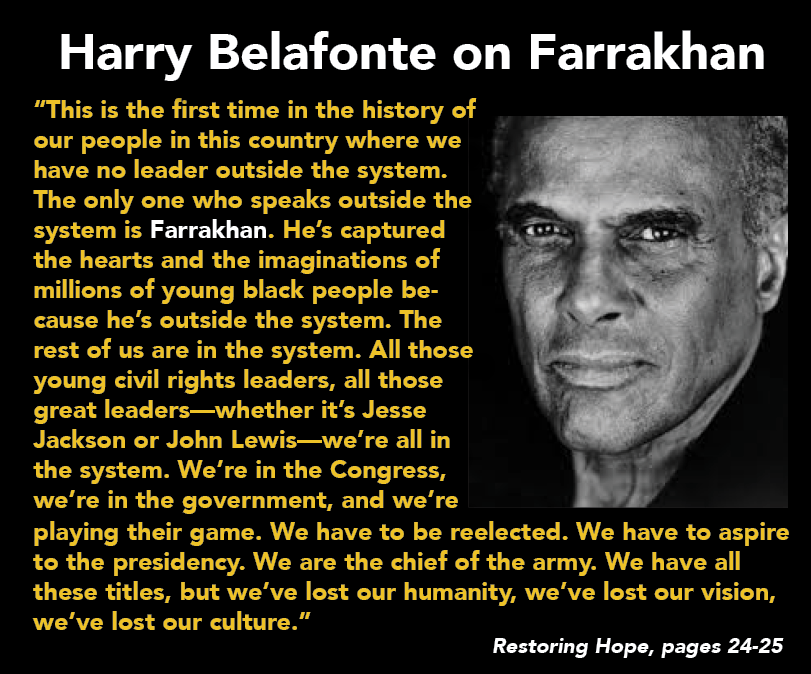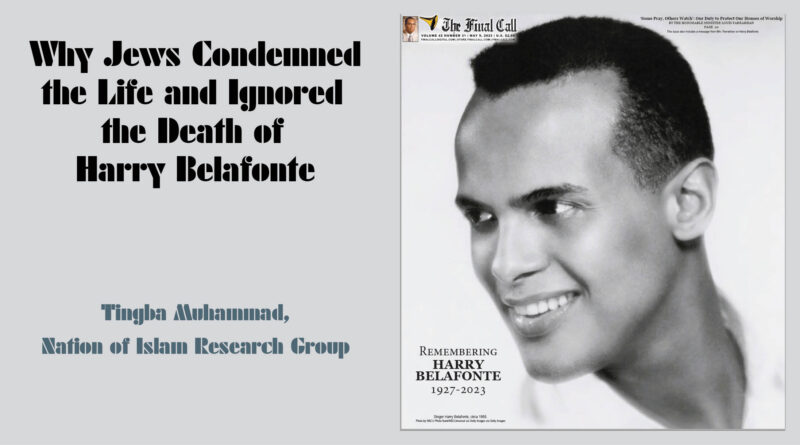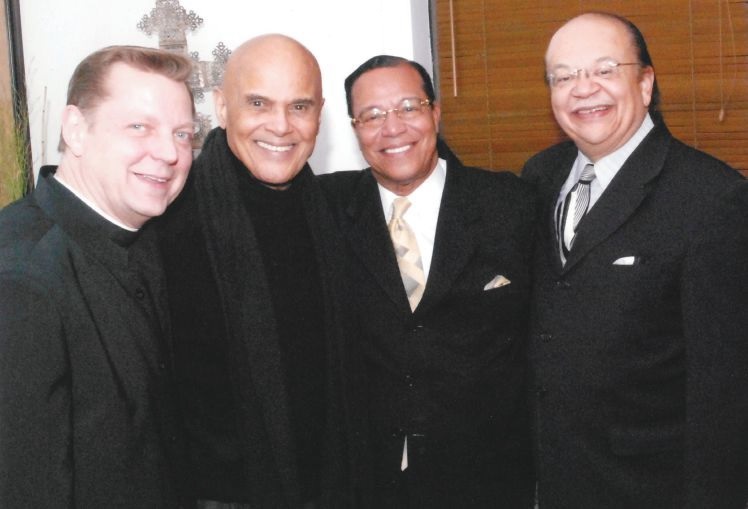Why Jews Condemned the Life and Ignored the Death of Harry Belafonte
Why Jews Condemned the Life and Ignored the Death of Harry Belafonte
Tingba Muhammad, Nation of Islam Research Group
“This is the first time in the history of our people in this country when we have no leader outside the system. The only one who speaks outside the system is Farrakhan. He’s captured the hearts and the imaginations of millions of young Black people because he’s outside the system. The rest of us are in the system. All those young civil rights leaders, all those great leaders—whether it’s Jesse Jackson or John Lewis—we’re all in the system. We’re in the Congress, we’re in the government, and we’re playing their game. We have to be reelected. We have to aspire to the presidency. We are the chief of the army. We have all these titles, but we’ve lost our humanity, we’ve lost our vision, we’ve lost our culture.”
—Harry Belafonte (1927–2023)
The world mourns the passing, at 96, of the activist and icon Harry Belafonte. Among the many honors that poured in were tributes from presidents Biden, Obama, and Clinton of the United States, the leaders of African and Caribbean nations, and United Nations Secretary-General António Guterres, who said Mr. Belafonte, reflecting the spirit of many leaders, “devoted his life fighting for human rights and against injustice in all its forms.” Every Black organization and leader from the NAACP, the National Urban League, and SNCC to the Congressional Black Caucus and the United Negro College Fund expressed their condolences. The Honorable Minister Louis Farrakhan and the Nation of Islam dedicated a special 48-page commemorative issue of the Final Call to the life and legend of Harry Belafonte.
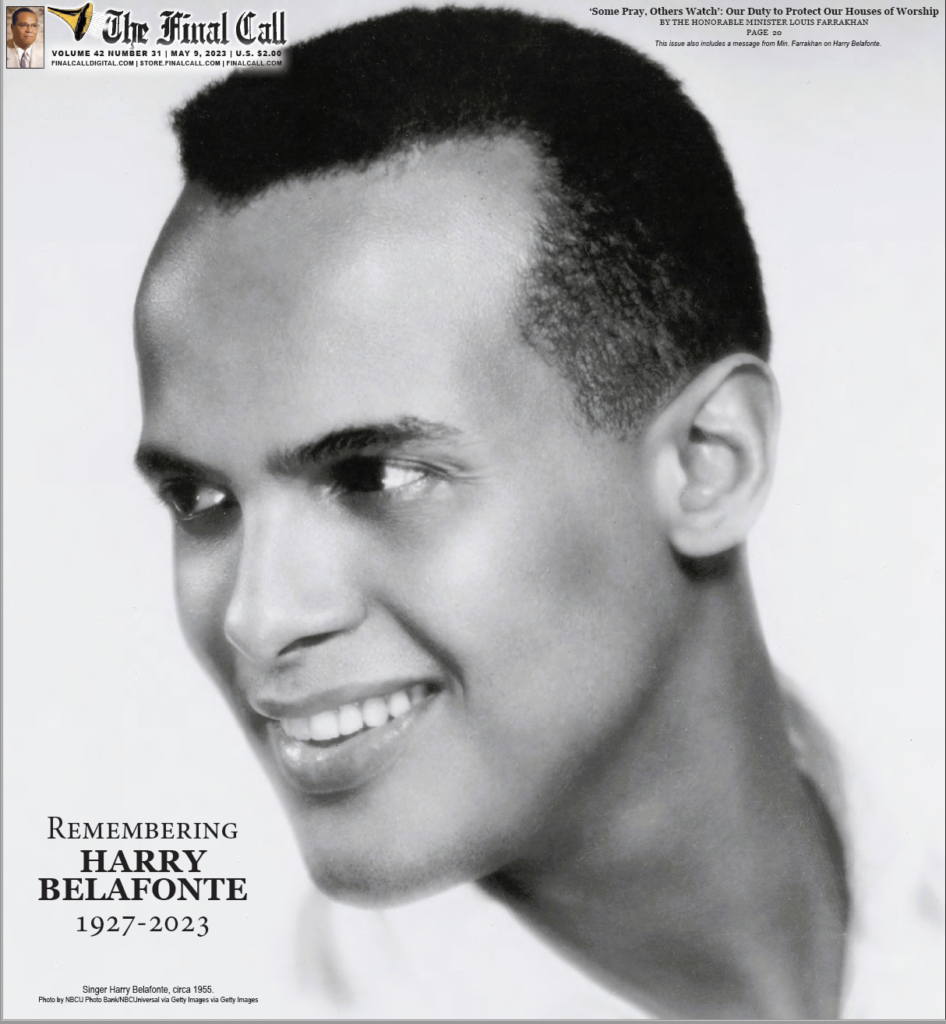 All over the world the high and mighty shared their memories of a true justice warrior, yet one segment of the “civil rights” establishment was blatantly silent. None of the major Jewish organizations even acknowledged Belafonte’s passing, offering not a single statement of condolence or even a gesture of respect to honor the life of a man who so publicly fought against racism and anti-Semitism at every turn. In unison and apparent collusion, Jewish leaders who claim to be dedicated to “civil rights” simply ignored the life and accomplishments of Dr. Martin Luther King’s right-hand man.
All over the world the high and mighty shared their memories of a true justice warrior, yet one segment of the “civil rights” establishment was blatantly silent. None of the major Jewish organizations even acknowledged Belafonte’s passing, offering not a single statement of condolence or even a gesture of respect to honor the life of a man who so publicly fought against racism and anti-Semitism at every turn. In unison and apparent collusion, Jewish leaders who claim to be dedicated to “civil rights” simply ignored the life and accomplishments of Dr. Martin Luther King’s right-hand man.
So, why have the Jewish organizations and leaders chosen to commit this supreme act of disrespect to Belafonte and the Black community in their hour of mourning?
In his 96 years Belafonte was unquestionably an ambassador to the Jewish people. His paternal grandfather was a Dutch Sephardic Jew, and he was three times married, twice to Jewish women. He performed in Israel several times and once quipped that he was “the most popular Jew in America” after his 1957 recording of the Hebrew classic Hava Nagila. He spoke often of Jewish suffering, and he was honored with awards by many Jewish organizations. The Anti-Defamation League once gave Belafonte a humanitarian award, but its current leader Jonathan Greenblatt and his predecessor Abraham Foxman said nothing at his death. The American Jewish Congress, Hadassah International, Yeshiva University, and National Council of Jewish Women all gave Belafonte humanitarian awards, yet NONE OF THEM would offer a single word of honor for any of those 96 years that the United States president said were dedicated to “breaking barriers and bridging divides.” American Israel Public Action Committee (AIPAC)—nothing; Simon Wiesenthal Center—nothing; American Jewish Committee, World Jewish Congress, Conference of Presidents of Major American Jewish Organizations—nothing, nothing, nothing. Belafonte performed in Israel and sang its praises, yet at his death there was only steely silence from Israel’s leader Benjamin Netanyahu and his government.
A closer look into Belafonte’s multi-generational history with the Jewish world provides a clearer view of why Jews chose to “anti-Semitize” a beloved Black leader. For many years the mainstream media with its heavy Jewish dominance has suppressed the fact that Belafonte became one of the most incisive critics of many “causes” dear to Jewish hearts, such as racial integration—the Jewish-financed agenda for Black people. Certainly, Jews must cringe when Belafonte remembers the very last thing the Rev. Dr. Martin Luther King said to him:
“You know, we fought long and hard for integration….But I tell you, Harry, I’ve come on a realization that really deeply troubles me. I’ve come to the realization that I think we may be integrating into a burning house.”
There is no doubt that King’s “burning house” revelation and his murder soon after caused Belafonte to re-examine the very foundations of the civil rights movement and the Jews that had been its most ardent supporters and allies. Over the years Belafonte recounted a few experiences that very likely sobered his assessment of the people he once believed to be God’s “chosen.”
A Jewish attorney named Stanley Levison worked his way into King’s inner circle, where he made crystal clear the Jewish objective while editing King’s 1958 book Stride Toward Freedom. According to FBI and Martin Luther King, Jr., author David Garrow, Levison counseled King “against including a segment on Black self-improvement and urging that he add a section on registration and voting…” This surreptitious manipulation of King’s guidance to his own people reflects the longtime Jewish hostility toward Black self-help programs like those of Booker T. Washington, Marcus Garvey, and The Most Honorable Elijah Muhammad. In 2013, Belafonte received the NAACP’s highest honor, the Spingarn Medal, named after the Caucasian Jewish man who founded, financed, and misguided the NAACP. As a “leader of negroes” Joel Spingarn was wholly dedicated to the notion of what he called “non-economic liberalism”—a philosophy that steers Blacks far away from an economic self-help strategy for their upliftment. Belafonte ultimately saw the pure hypocrisy in Jews financing a “non-economic” course for Blacks but pursuing a business-centered wealth-building strategy to achieve their own Jewish independence, and he became one of the harshest critics of “integration.” In 1996 he told Dr. Cornel West that
“I think that we are in the greatest jeopardy we have ever been in….I see a whole people being wasted and being denied and suffocated. I think black culture…is under the greatest onslaught of negativity that has ever existed. [W]e have been integrated out of culture. And those who are successful in that world have no sensitivity or commitment to this loss and this pain….So I tell you, yes, I feel that we have lost an awful lot. And we have done it in the name of integration.”
This had to be a major blow to Jews, who were in that very moment defending the virtues of the historical Black–Jewish relationship then under a major assault. Belafonte was in effect reflecting a pillar of the Nation of Islam Teaching, which unambiguously declares: “WE BELIEVE that the offer of integration is hypocritical and is made by those who are trying to deceive the black peoples into believing that their 400-year-old open enemies of freedom, justice and equality are, all of a sudden, their ‘friends.’” [What the Muslims Believe, Point Number 9]
Similarly, Belafonte took aim at the corrupted political system in America and the Black-vote-dependent Democrat Party, which to him seemed to be a dead end for Black aspirations:
“If anybody had told me thirty years ago when this [civil rights] campaign was on that we’d wind up [with high political offices] and we would not be able to make a vast difference in how black people are experiencing life, I’d have said you’re smoking dope.”
Clearly, Belafonte’s integrationist political outlook had changed. In 2005, at a Congressional Black Caucus Town Hall Meeting on Poverty (sitting beside Democrat Senators Barack Obama and Hillary Clinton), he eloquently recounted the paltry yields from 40 years of the promises of black politics and then made this audacious observation: “I guess part of the reason I’m here is to really look through the ravages of the Democratic Party and see if anything is really worth salvaging!” With the Democrat party awash with Jewish money, Belafonte’s comments again sent shockwaves through America’s Jewish elite.
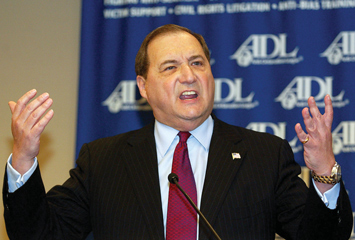 Belafonte did not restrict his political critique to Democrats. In 2002, he blasted the Republican administration of George W. Bush and its Israel-driven wars in the Middle East. Belafonte publicly called Bush “the greatest terrorist in the world” and said the unsayable—that the Iraq war “was all about oil.” But most offensive to the Jewish neo-con war-mongers that pervaded Bush’s inner sanctum was Belafonte’s condemnation of Secretary of State Colin Powell and National Security Advisor Condoleezza Rice as “house slaves [who] served their master well.” Strangely, even though no Jews were targeted by Belafonte, the Jewish Anti-Defamation League’s leader Abraham Foxman stepped in to chastise the Black man, ordering him to “refrain from references to slavery,” which Foxman said “demean and degrade and contribute nothing constructive to the serious and important policy debate in which our nation is currently engaged.” Belafonte exploded at Foxman:
Belafonte did not restrict his political critique to Democrats. In 2002, he blasted the Republican administration of George W. Bush and its Israel-driven wars in the Middle East. Belafonte publicly called Bush “the greatest terrorist in the world” and said the unsayable—that the Iraq war “was all about oil.” But most offensive to the Jewish neo-con war-mongers that pervaded Bush’s inner sanctum was Belafonte’s condemnation of Secretary of State Colin Powell and National Security Advisor Condoleezza Rice as “house slaves [who] served their master well.” Strangely, even though no Jews were targeted by Belafonte, the Jewish Anti-Defamation League’s leader Abraham Foxman stepped in to chastise the Black man, ordering him to “refrain from references to slavery,” which Foxman said “demean and degrade and contribute nothing constructive to the serious and important policy debate in which our nation is currently engaged.” Belafonte exploded at Foxman:
“Why are references to slavery demeaning?…Slavery is an important part of this nation’s history. An absolutely critical part of any analysis that is done in defining black Americans….This nation has never really confronted, debated or had any fair exchange on this issue of slavery. We went from the strict confinement of physical slavery—with chains, shackles and whips—to the spiritual and psychological chains of slavery in the following century of legal segregation in this country.”
After King’s death and the deliberate stalling of the civil rights movement, Belafonte’s international activism became more pronounced. He openly criticized U.S. foreign policy and outreached to “third world” governments and leaders that America and the West had despoiled, opening dialogue with Cuba, South Africa, the Caribbean nations, and even praising peace initiatives by the Soviet Union. Belafonte joined Sidney Poitier and others to fund a scholarship program in Kenya that allowed a young Kenyan student to study in Hawaii, where he met a young white woman and produced a child that would become the first Black president of the United States, Barack Obama.
Belafonte had clearly evolved from a singer of popular Jewish melodies to an outspoken activist who recognized that the same kind of apartheid system he fought beside Nelson Mandela and Archbishop Desmond Tutu to overthrow in South Africa, was now entrenched in the “State of Israel” against the Palestinian people. Upon Mandela’s release from prison in 1990, Belafonte organized a hero’s welcome for him in an eight-city tour around America. And in remarks to a Jewish group, Belafonte recounted the U.S. State Department’s warning to him that he said “struck me very, very deeply.” They informed him that “there are segments of the Jewish community that find his [Mandela’s] presence in this country unwelcome, and they will make their feelings heard, and we are concerned about that because one group in particular has been noted for its willingness to do violence.” Belafonte must have recalled that six years earlier Jews had deliberately created a violent atmosphere around presidential candidate Rev. Jesse Jackson, actually calling for him to be “ruined” in a New York Times advertisement (right)—a volatile situation that The Honorable Minister Louis Farrakhan publicly addressed and that necessitated the Nation of Islam providing security for Jackson and his family.
By 2017, Belafonte joined Angela Davis, Alice Walker, and many other activists of the Boycott, Divestment and Sanctions (BDS) movement in signing an open letter appealing to NFL players to boycott a “propaganda trip organized by the Israeli government that aims to prevent players from seeing the experience of Palestinians living under military occupation.”
Belafonte would recall that it was just this issue of Jewish–Israeli oppression of Palestinians that triggered the most jarring convulsions in the alleged Black–Jewish alliance. Jewish money backing the civil rights movement dried up when Blacks began discussing the commonality of the Black-American and Palestinian struggles. In 1979, President Jimmy Carter’s U.N. ambassador Andrew Young was summarily fired for simply meeting with a Palestinian leader; Jesse Jackson was attacked brutally in 1984 for suggesting that his candidacy for president would be fair to the Palestinian people; and Minister Farrakhan was called a “Black Hitler” for defending Jackson on the Palestinian issue. So, Harry Belafonte’s successful effort to block Israel’s attempt to make Black NFL players “ambassadors of goodwill for Israel” was a decisive setback. The Guardian reported it this way: “The Israeli government has suffered an embarrassing blow after it emerged that only five of 11 NFL players turned up for an all-expenses paid PR trip organized to improve Israel’s image.”
Belafonte’s Early Black–Jewish Battles
None of the commemorative reflections of Harry Belafonte’s admirers took into account his own Black–Jewish memories, which may have crystalized for him later in his career. Such as when in June of 1962 he performed at an Atlanta fundraiser for Dr. King for a racially integrated audience of 5,000. Belafonte, Dr. King and his wife, Coretta, and several members of their entourage attempted to eat lunch at Leb’s Restaurant—one of nine owned by a Jewish racist named Charles Lebedin—only to be turned away. When Belafonte returned to Leb’s the following morning, he was again refused service. Aware of the bad press his racism had caused, “Leb” played the “Jewish suffering” card: “I know how it feels to be discriminated against, and I’m a great admirer of Belafonte. But I can’t integrate my restaurant because the others won’t.” Lebedin’s allusion to his Jewishness only further infuriated Belafonte, who pointed out that there were many integrated restaurants in Atlanta. “I’m not impressed with Mr. Leb’s Jewishness. I am married to a Jew.” Dr. King called the incident “a tragedy for Atlanta” and threatened “a full-scale sit-in movement” if Lebedin’s segregationist policy was not reformed.
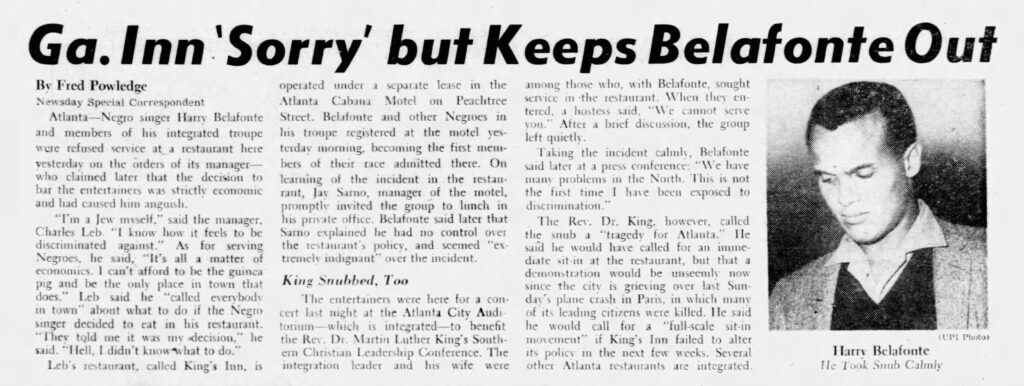
In fact, Lebedin, who called himself “a proud Jew” with many Jewish customers, doubled-down and a month later Blacks “staged a three-hour stand-in” at a Leb’s fundraiser for Atlanta’s Jewish Home for the Aged for which advertisements offered, “Come One Come All!” Lebedin said he was “not going to serve them [Blacks] today or any other day.”
This only escalated mass demonstrations at Leb’s and according to the Atlanta Constitution, Lebedin “hired goons to keep integrators out,” and Ku Klux Klansmen stood with Lebedin to enforce Jim Crow law. It was his snub of Belafonte and King that put the Jewish segregationist at the center of civil rights protests and exposed Atlanta’s Jews as civil rights hypocrites.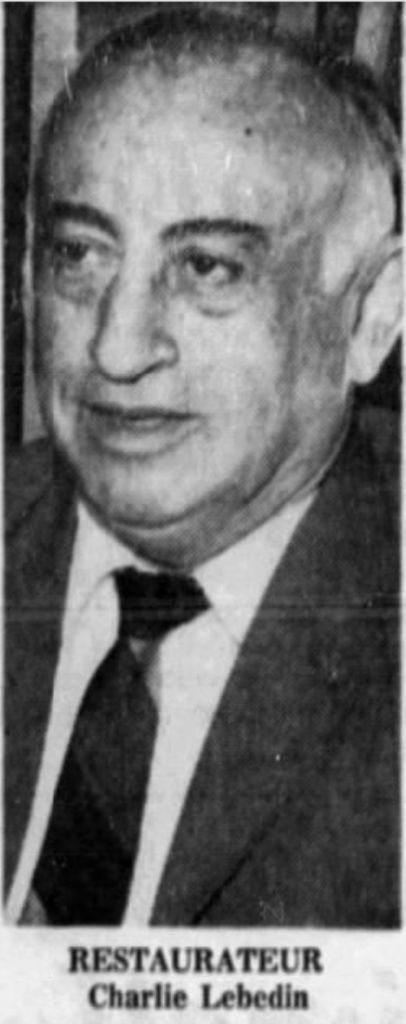
More than a hundred demonstrators were arrested attempting to eat at Lebedin’s restaurants, but it was he that complained: “I’m very bitter and hurt. I’m a very strong segregationist now….The negroes have made me that way.” Lebedin and his restaurant manager stood outside a dinner honoring King’s win of the Nobel Peace Prize, shouting: “What a hullabaloo over a nigger…I ought to give him a piece of my fist.”
Belafonte’s experience with Jewish Hollywood was no less traumatic, and he recounted his frustration at its treatment of him: “I put script after script before people who just rejected them out of hand, and I just said there’s no point in trying to change this monster. They would not listen to my gods.”
In 1960, Belafonte received an Emmy for a television special he did for the “Revlon Hour,” called “Tonight with Belafonte.” He then describes what that did for his career:
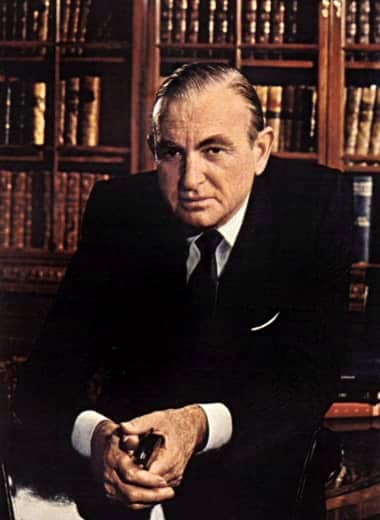
“‘Now I get called by [Revlon owner] Charlie Revson to have a meeting,’ he told me. ‘Would I come alone? I can’t wait—I’m figuring he wants to give me half the company, or something. So we’re having lunch in his private dining room, and he’s saying, “As a Jew in Jersey City, I understand oppression—da, da, da, da—but we have to talk about the show. Good ratings. Good reviews. Very nice. But we’re getting some response that says you should do it all-black. If you could just take all the white people out…” I couldn’t believe it. And I said, “Mr. Revson, let me tell you something. If you’d asked me to put on a flowery shirt and sing more calypso tunes, and dance more, because that’s what white people would like, I would consider it. But what you’ve asked me to do—there’s no way to square it. I cannot become resegregated.” He said, “O.K.” Four o’clock that afternoon, I had a check for eight hundred thousand dollars [$8 million dollars in today’s money]. Charlie Revson said, “Goodbye. You’re off the air.”’”
As his thinking evolved, Belafonte moved decisively away from political and social integrationism and publicly supported freedom and independence efforts that earned him the ire of Jewish leadership. Certainly, Belafonte’s incredible career as an entertainer and an activist offered him a wealth of experiences and interactions with Jews that ordinary Black Americans had no chance of having. His unique presence at the very heart of the civil rights movement makes his criticism of it especially poignant and instructive.
Beyond the plaudits and platitudes, Harry Belafonte’s history with Jews was rife with conflict and controversy, which we now know was the fate of every single Black leader of significance going back centuries—all had bitter run-ins with the Jewish leaders of their day. From the hunters of African maroons that escaped from Jewish plantations in 17th-century Surinam, to the Jews who helped hunt down Nat Turner, to the Jewish attacks on Booker T. Washington, W.E.B. DuBois, Marcus Garvey, Malcolm X, The Most Honorable Elijah Muhammad, Martin Luther King, Nelson Mandela, and now The Honorable Minister Louis Farrakhan, all of whom felt the lash of the false charge of “anti-Semitism.” In his passing, we can now see that Harry Belafonte has joined that extraordinary and blessed Black fraternity.
In expressing their grief and their honor for the life and legend of Harry Belafonte, Blacks embrace his life’s evolutionary journey and the lessons that he left for us. His “supreme integrity, honesty, and commitment,” as Minister Farrakhan affirmed, must never be forgotten. The monumental act of Jewish disrespect for Harry Belafonte only increases his legend and illuminates his legacy.
